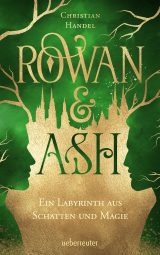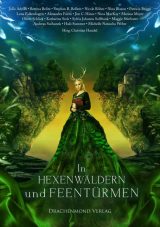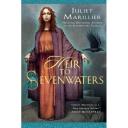 To celebrate the German release of “Heir to Sevenwaters” I asked lovely Australian writer Juliet Marillier to do another interview with me.
To celebrate the German release of “Heir to Sevenwaters” I asked lovely Australian writer Juliet Marillier to do another interview with me.
In the following Q&A she talks about her return to Sevenwaters, about why she chooses oridinary women as heroines, about research and many more …
Enjoy!
To give the reader a feel of what awaits him or her in „Heir to Sevenwaters”: Could you please describe the atmosphere of the book in one or two sentences?
A devastating event turns Clodagh’s well-ordered world upside down. In order to set things right, she must undertake a quest that will stretch her to her limits and change her future forever.
How does the book differ from your previous „Sevenwaters”-novels (in case it does)?
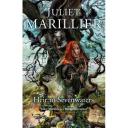 In Heir to Sevenwaters the characters travel to the Otherworld part of Sevenwaters, home to both Tuatha de Danann (Fair Folk) and Fomhoire (Old Ones) as well as various other uncanny races. Quite a lot of the action takes place there. There’s a much greater involvement of those Otherworld characters in this story. The novel is a bit shorter than the first three Sevenwaters books – publishers are not so keen on long books these days – and that has an impact on way I structure the story.
In Heir to Sevenwaters the characters travel to the Otherworld part of Sevenwaters, home to both Tuatha de Danann (Fair Folk) and Fomhoire (Old Ones) as well as various other uncanny races. Quite a lot of the action takes place there. There’s a much greater involvement of those Otherworld characters in this story. The novel is a bit shorter than the first three Sevenwaters books – publishers are not so keen on long books these days – and that has an impact on way I structure the story.
What did inspire you to make the fourth Sevenwaters-novel a changeling-story?
I find traditional changeling stories fascinating. Most people who find a changeling in place of their own baby are angry and grief-stricken. I wondered what would happen if the person who discovered the changeling did not see it as an evil travesty of a baby, but as a child in its own right, worthy of love? What if the changeling only seemed alive to that one person, and she had to fight for its right to survive?
Your heroines are in no mighty sorceresses but mainly normal woman who find the inner strenght to fulfill their quests. How important is it for you to show women with more traditional skills than the amazons and witches of epic fantasy?
I love to put real women in the centre of my stories. I am a little tired of the kick-ass kind of heroine who is so prevalent in speculative fiction these days – there’s no need for every female protagonist to act like a man in order to win the day, nor for her to be a queen or a mightly sorceress. I like to see a balance, and because there aren’t many 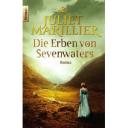 feminine women as protagonists in fantasy novels, I tend to choose them as my heroines.
feminine women as protagonists in fantasy novels, I tend to choose them as my heroines.
In medieval Ireland there were probably a few warrior women around, but not many (it’s worth remembering that Sevenwaters is set in the real world, not a created alternative world.)
It’s in the interests of historical realism that at least some of my heroines are housewife types.
Clodagh is particularly strong on domestic skills and when she faces tests and trials in the Otherworld, those are the skills she uses to solve her difficulties. I believe she’s a protagonist ordinary readers will find it easy to identify with.
And how does Clodagh differ from the other „Sevenwaters” heroines?
Clodagh starts the novel with a fairly limited sphere of interest and focus – she‘s a domestic paragon like her mother, and for reasons that become plain as the story unfolds, she expects she may stay at Sevenwaters all her life. An unexpected crisis jolts her out of her comfortable world, and forces her to challenge herself and question her beliefs and values.
While Sorcha, Liadan and Fainne are all extraordinary in their different ways, Clodagh is an ordinary woman whose great strength is her ability to recognise that even the most flawed individual is worthy of love. This ability for all-inclusive love is the key to her quest.
Is it necessary to have read the three previous novels to understand what happens in „Heir to Sevenwaters”?
No, though people who have read the first three books will have enhanced enjoyment of the new one. Heir to Sevenwaters is a stand-alone story. It takes the Sevenwaters family in a whole new direction – the Fair Folk in the previous instalments have always been quite well-disposed toward the human characters, but that has all changed with the arrival of a powerful new player. The uncanny elements of the story are darker than in previous instalments.
Did writing the novel challenge you as a writer in a way it didn’t occur before?
 It was challenging to go back to Sevenwaters after eight years. During that time I’ve written eight other novels, some of them in a very different style. I had not originally expected to continue the Sevenwaters series, but it was so popular that I allowed my publisher and agent to persuade me.
It was challenging to go back to Sevenwaters after eight years. During that time I’ve written eight other novels, some of them in a very different style. I had not originally expected to continue the Sevenwaters series, but it was so popular that I allowed my publisher and agent to persuade me.
I was concerned that the new book might not match the first three to readers‘ satisfaction, as my writing has changed and developed over those years. But once I started writing I found if easy to slip back into the Sevenwaters setting, and I grew very attached to the characters.
I think Heir to Sevenwaters is probably a little different from the first three but I am happy with the result – it was a pleasure to write.
Love plays a big part in your novels. But you also show how these romantic couples get separated by death eventually: Red looses Sorcha, Ciaran sees Niamh die and Sean fears for Aislings live in „Heir of Sevenwaters”. Why do you take the chance to show also this more tragic side of live and love in your novels?
I’m always conscious that the happy endings of fairytales can’t be happy endings for everyone, or for ever more. Life contains happiness and sadness, grief and joy, achievement and failure. I don’t think I could be true to myself as a storyteller if I didn’t reflect all of this, even if the romantic couples in my books usually do get their ‚happy for now‘ endings.
A lot of your fictional characters are – as yourself – great storytellers. So interwoven in your novels are a lot of small traditional stories. Are these all folklore tales or did you create some of them yourself? How did you find all these stories and how much research do you do for your novels?
I have used traditional stories a few times, though rewritten in my own words, but more often I have made up new stories in the mode of folklore. It’s not difficult for me to find appropriate stories or to write new ones, because I love folklore, mythology and fairytales and read them all the time. I’ve been doing that since I was a very small girl!
 I do a lot of research for all my novels, especially the more historically based series such as the Bridei Chronicles. Despite that, I don’t claim any great historical authenticity for the Sevenwaters books. When I wrote Daughter of the Forest it was with the intention of placing a real family into the setting of a fairytale and finding out how it affected them. The story didn’t grow its medieval Irish framework until a later revision – the setting started out as an invented world.
I do a lot of research for all my novels, especially the more historically based series such as the Bridei Chronicles. Despite that, I don’t claim any great historical authenticity for the Sevenwaters books. When I wrote Daughter of the Forest it was with the intention of placing a real family into the setting of a fairytale and finding out how it affected them. The story didn’t grow its medieval Irish framework until a later revision – the setting started out as an invented world.
As a result, some of the history is a little flawed. I‘ve talked more about that in the Q&A on my website.
How would you describe the type of book you write to someone who hasn’t read your novels yet?
My novels are a blend of folkloric fantasy, history, romance and family saga. I often write in the first person, and my main protagonist is usually a young woman. My books appeal not only to fantasy readers, but to readers of historical romance who like Celtic settings and a touch of folkloric magic.
If you could meet a fictional character (of your own works or from anothers author) who would it be and why?
I‘ll choose Jane Eyre from Charlotte Brontë’s novel of the same name. Jane Eyre is the prototype Gothic romance, and Jane is a wonderful character, a passionate, romantic soul in the body of a plain little governess.
If I were choosing one of my own characters, it would be Liadan from Son of the Shadows, as she is the character I’d most like to be.
Are there plans for future Sevenwaters-stories?
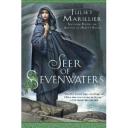 Yes! The next instalment, Seer of Sevenwaters, has been published in both Australian and American editions. I’m currently writing another Sevenwaters novel with has the working title Return to Sevenwaters. That will come out in its English language editions some time toward the end of 2012. Of course I’m hoping for German editions of both – readers, please encourage your friends to buy Heir to Sevenwaters, so the publisher decides to bring out the later novels too!
Yes! The next instalment, Seer of Sevenwaters, has been published in both Australian and American editions. I’m currently writing another Sevenwaters novel with has the working title Return to Sevenwaters. That will come out in its English language editions some time toward the end of 2012. Of course I’m hoping for German editions of both – readers, please encourage your friends to buy Heir to Sevenwaters, so the publisher decides to bring out the later novels too!
Readers may be interested to know I have a new series coming out as well – the Shadowfell series, set in a magical version of ancient Scotland. The first of those will also be published in 2012.
Thank you very much!
Please visit Juliet Marilliers website for more information on her and her works.
Read another interview with Juliet Marillier from 2008: here!
More about her new series “Shadowfell”: here!
